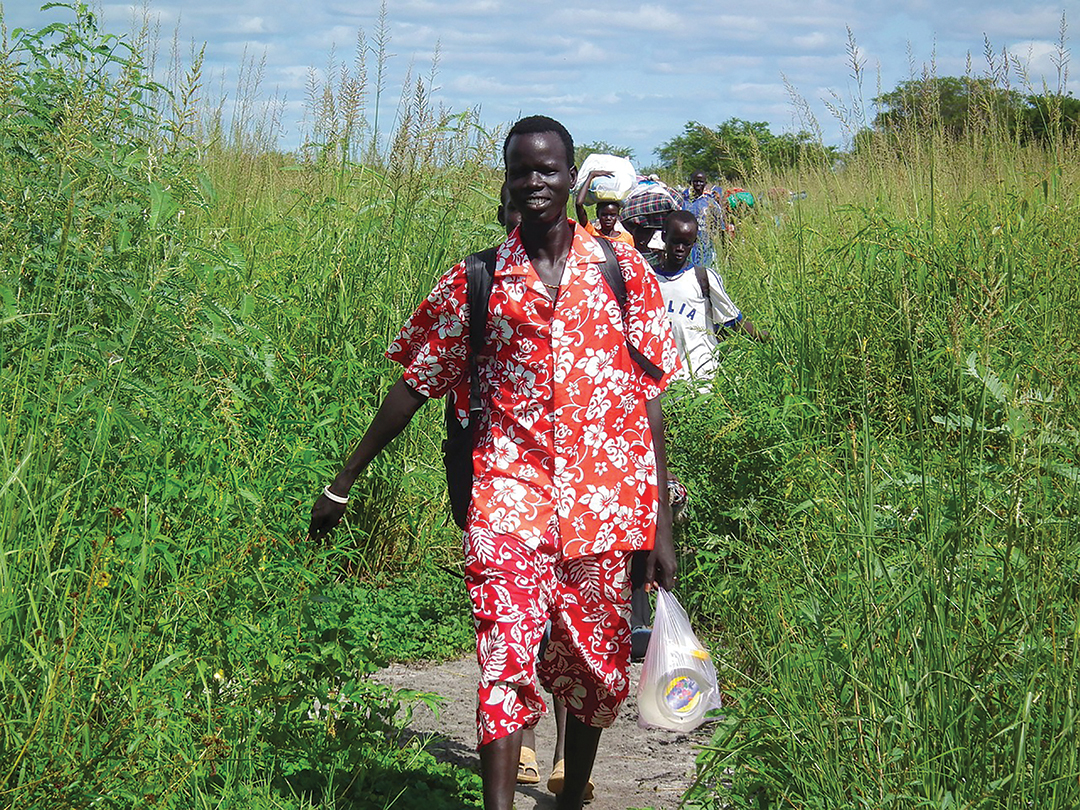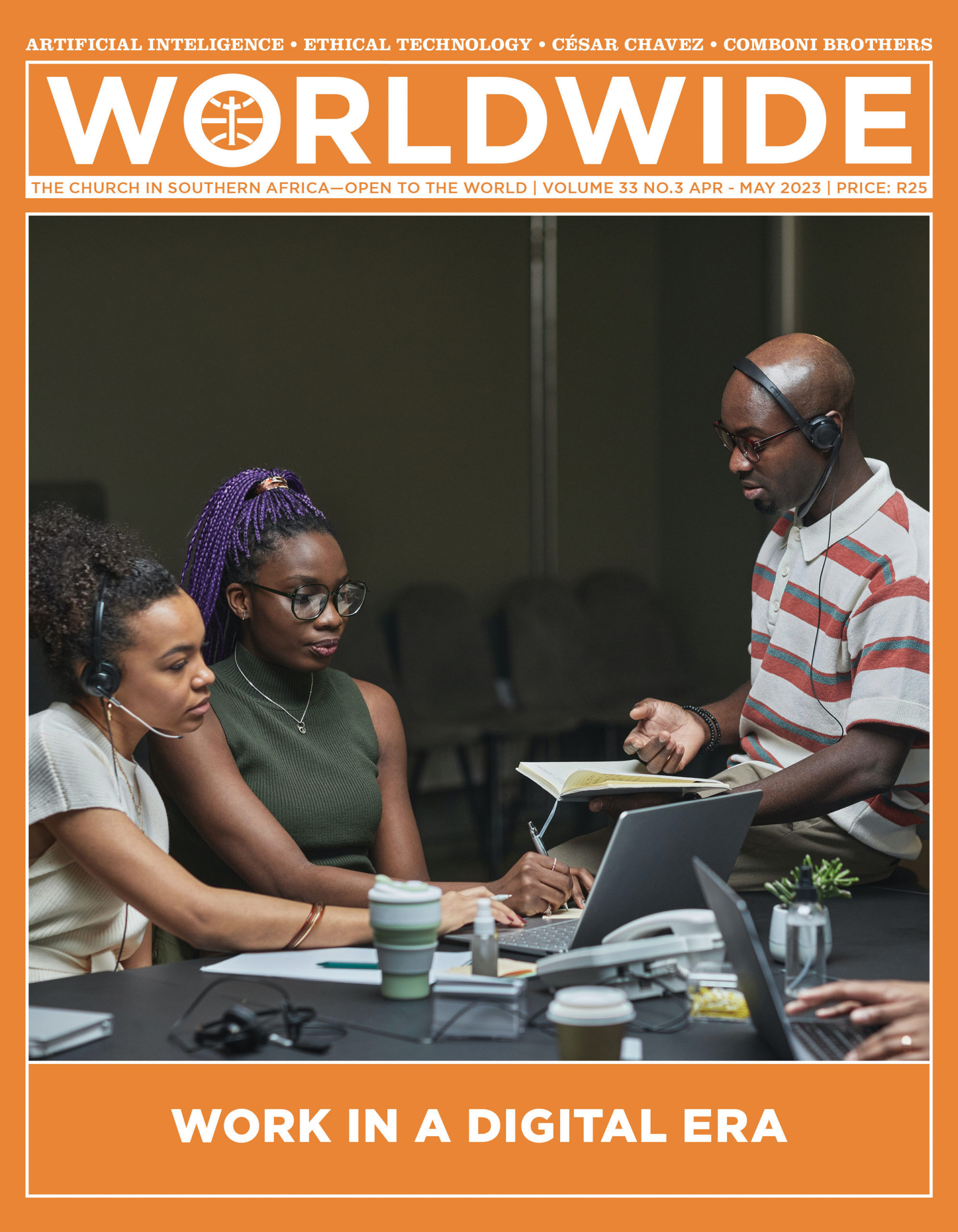
WORK IN A DIGITAL ERA
In the image we see a group of work colleagues discussing and planning their activities. They seem to have fun and an amicable relationship. The future of work passes through team work and co-operation in a spirit of mutual collaboration.
REFLECTIONS • AFRICAN LIVELIHOODS

JOB SEEKING AND JOB CREATION
Today many job seekers find that with challenges to the prospect of finding employment, they need to dig deeper and become more innovative and enterprising by creating jobs that add value to society. This goes for graduates, tradespeople and general workers alike. This approach, although daunting, leads to security, innovation and in some instances huge success!
BY MARIOLA BRAVO | WRITER, PRETORIA
Work as integral to life
In theory, we are free, with democratic constitutions making provision for fair work and pay at a grassroots level—but taking for granted the availability of work and access to livelihood, amounts to living in a fool’s paradise. The unfortunate reality is that most university graduates
have no employment prospects, while laypersons and labourers are limited, finding it hard to celebrate the recent increase by Minister Thulas Nxesi, South African Department of Employment and Labour, of the minimum wage in South Africa to R25.42 per hour.
While unemployment is a growing global phenomenon, rampant unemployment rates plague the African continent. South Africa’s unemployment rate was 32.7% in the fourth quarter of 2022 (businesstech. co.za 2023). Improvement in the situation seems far off with headlines speaking of huge job cuts and even a complete economic shutdown.
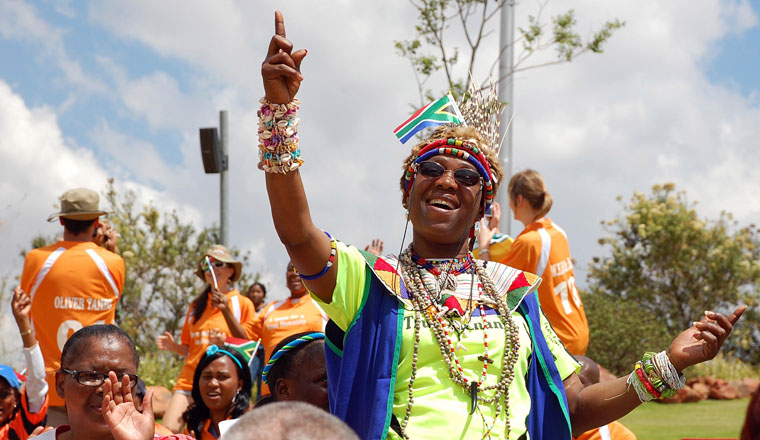
Similarly, other African economies such as Angola, had 30.2% unemployment in June 2022, and Nigeria, 33.3% in December 2020 (tradingeconomics.com) show alarming numbers of about one in three people and their families having no fixed income. Work is meant to evoke rich personal growth, where creativity, a legacy for the future, development of our talents, living out our values, relating to others and giving glory to God, enter into play.
Will we harness the future of Africa’s remaining resources and ensure the future of its people?
Pope Francis (2016), says the following regarding the role of work in human society: “It is clear from the very first pages of the Bible that work is an essential part of human dignity; labour also makes possible the development of society and provides for the sustenance, stability and fruitfulness of one’s family.” Pope Francis quotes the Bible (Ps 128: 5, 6): ‘May you see the prosperity of Jerusalem all the days of your life! May you see your children’s children!’ The fact remains, Africa has never failed to be a land of abundance, rich in natural resources, stable weather conditions and a strong and vibrant people. With families unable to sustain themselves on minimum wages, recent decades have seen farmlands abandoned and breadwinners flocking to cities in search of opportunity. In these cities, nevertheless, it seems that dreams of a better life are not met with fulfilment. This long-standing problem of failure to create, provide and seize opportunity, leaves many African populations in abject poverty. Where did things go wrong? Where do we stand here and now? Where can we contribute to change?
Leadership, governance and globalisation
The world is becoming one. Globalisation is slowly integrating all companies, governments, and people of different nations. Money is central, considered the mover of all things. Leaders are fierce and wielding more power than ever, while human dignity and God’s will are cast aside as irrelevant! Pope Benedict XVI (2009) said it best when
he proclaimed, “I would like to remind everyone, especially governments engaged in boosting the world’s economic and social assets, that the primary capital to be safeguarded and valued is man, the human person in his or her integrity: man is the source, the focus and the aim of all economic and social life.” A lot can be said for Africa historically in terms of sound governance. Among the great civilisations born of Africa are the Zimbabwean Empire of Mwenemutapa, the Ethiopian/Aksumites
and Nubians, and the Egyptian Empire. Why then be doubtful that going forward, such good governance—often steeped in religious devotion—cannot again emerge?
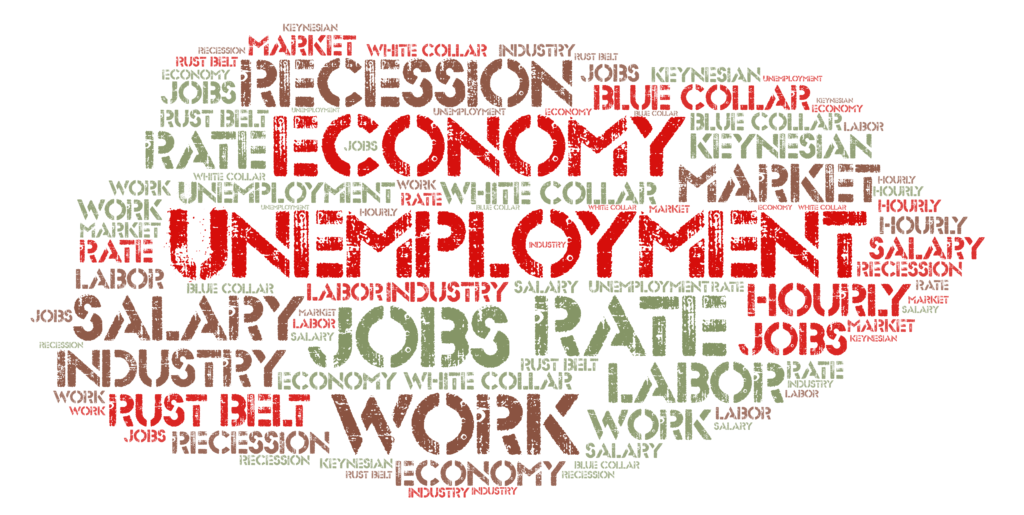
Ubuntu, for example, stems from the ancient Zimbabwean civilization of
Mwenemutapa that practised ubuntu governance, meaning that ubuntu is more than just a philosophy but a practice. Ubuntu is an ancient Nguni word which emphasizes the importance of the group or community, as well as sharing and the moral attributes of a person. The Zulu saying, ‘umuntu ngumuntu ngabantu,’ meaning, ‘I am because we are’, sums up the spirit of this practice. St Paul’s letter (Gal 5:13, 14) resonates beautifully with the core values of ubuntu, when he says, “For you were called to freedom, brethren; only do not use your freedom as an opportunity for the flesh, but through love be servants of one another. For the whole law is fulfilled in one word, ‘You shall love your neighbour as yourself.’”
Past colonialism and future Artificial Intelligence
The past and the future should be factored in as we navigate towards tomorrow. The advent of the 4th Industrial Revolution (4IR) and the rise of Artificial Intelligence (AI) and robots has serious implications for job creation not only here in Africa, but worldwide—the two notions are, in
fact, irreconcilable. As the 4IR progresses, technology, products, and information will be spread at a faster pace than ever imagined. Realistically, there will be new developments which transform the way
people live, work and relate to one another. Although many developments are extraordinarily positive, for example, in the field of prosthetics and implementing AI in risky situations, the propensity
of industries to create profit at any cost, consistently cheats the common man of his human rights and dignity.
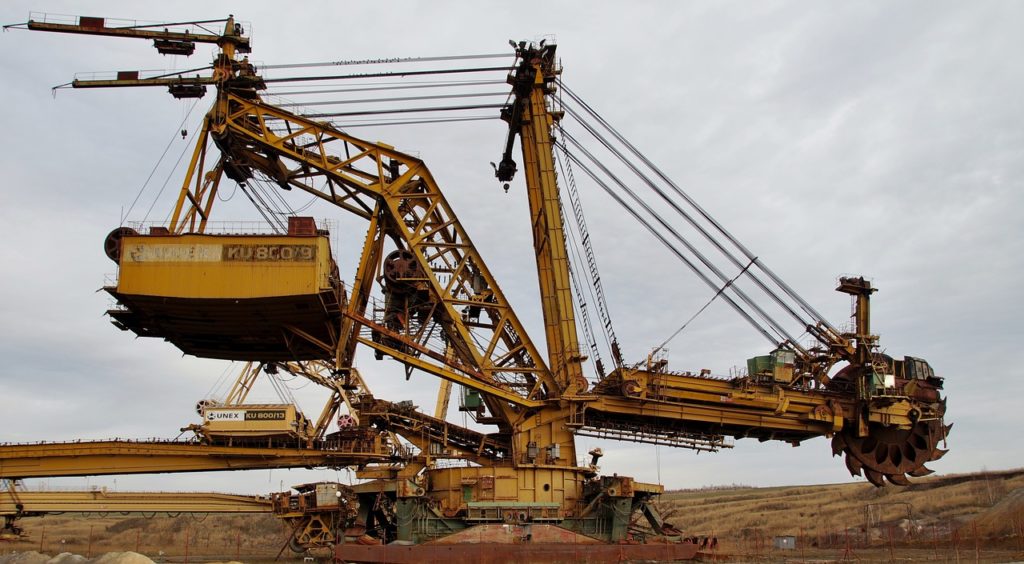
This is not to say that AI will not drive massive innovation. However, with the advent of the Fifth Generation (5G) technology together with airborne drone capability and advanced robot mobility, AI will very soon become mobile. Data collection and mimicry of all human endeavour have been ongoing for decades. Together with software development, AI mobility will make human labour all but obsolete, replacing almost all humans in jobs with AI robot alternatives, including, but not limited to teaching, transport of people and goods, law, medicine, policing, mining
and possibly even farming. With humans needing access to resources to survive, this can easily cause humankind to be perceived as nothing more than a liability to the system—a far cry from the plans God has for us, I am sure! With unemployment set to become the norm, this may be
the last opportunity to determine how we navigate into this new territory. Proverbs 12: 11 tells us clearly that, ‘He who tills his land will have plenty of bread, but he who follows worthless pursuits has no sense.’
Failure to address unemployment issues holistically and immediately will mean that positive change
will not be possible
In many cases, poverty results from a violation of the dignity of human work, primarily because work opportunities are limited. Pope Benedict XVI (2009) observed this saying, “…a low value is put on work and the rights that flow from it, especially the right to a just wage and to the
personal security of the worker and his or her family.” Failure to address unemployment issues holistically and immediately will mean that positive change will not be possible, which may later create room for
rebellion and destruction. The question is, will we harness the future of Africa’s remaining resources and ensure the future of its people? Will handshakes happening behind the scenes once again shortchange that dignity of the common man? Will Africa and its people find the courage
and stamina to steer themselves towards a future worthy of future generations? These are questions for each of us to answer for ourselves.St John Paul II (1991) touched on the subject of gross unemployment when he said, “The obligation to earn one’s bread by the sweat of one’s brow also presumes the right to do so. A society in which this right is systematically denied, in which economic policies do not allow workers to reach satisfactory levels of employment, cannot be justified from an ethical point of view, nor can that society attain social peace.”
Skills development and job creation
It will take heart and sheer determination to emerge triumphant from such dire circumstances of unemployment. The development of entrepreneurial skills must take precedence over mere job-seeking. Skills development, improved education programmes and solid life skills need urgent attention. These objectives need support from parents in the home, government institutions, the Church and society as a whole.

Pope Francis (2013) says “Growth in justice requires more than economic growth while presupposing such growth: it requires decisions, programmes, mechanisms and processes specifically geared to a better distribution of income, the creation of sources of employment and an integral promotion of the poor which goes beyond a simple welfare mentality. I am far from proposing an irresponsible populism, but the economy can no longer turn to remedies that are a new poison, such as attempting to increase profits by reducing the workforce and thereby adding to the ranks of the excluded.”
Some of the many ways Africa can address unemployment include: translating economic growth into sustainable decent jobs; moving from subsistence to entrepeneurship farming; reform in education and training; harnessing the benefits of the digital economy; rural development; conservation; Pro-African import and export precedents; and mechanisation for local production of goods and services. These and many more areas need reform and righteous innovation, knowing now already, that in Africa, more jobs are required, not less!
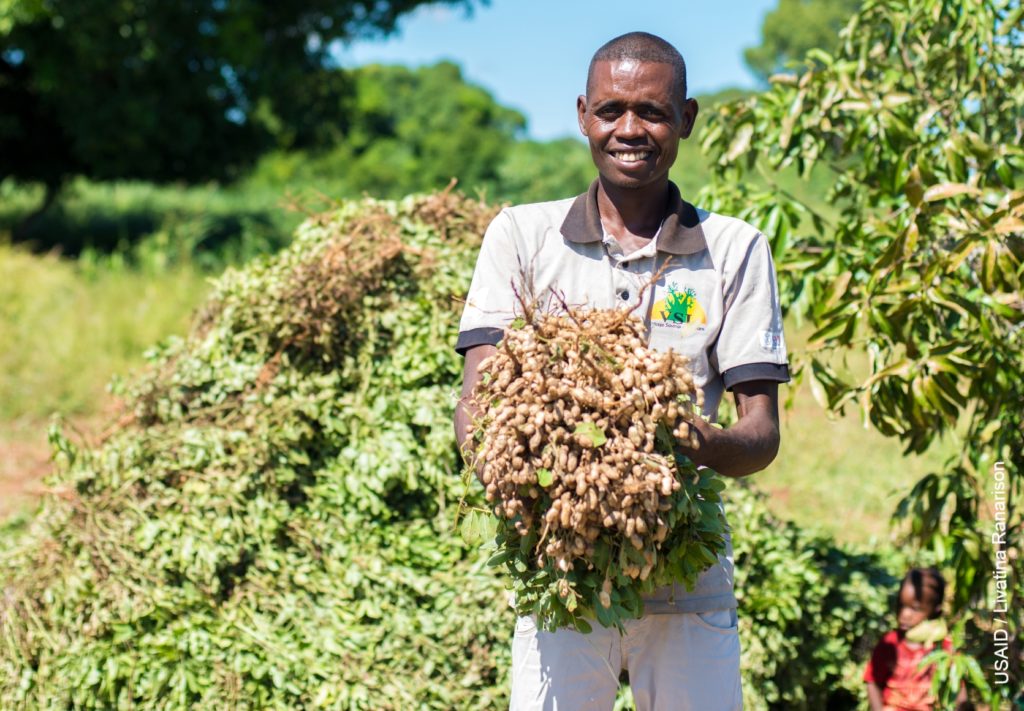
We know that luxury is not always synonymous with quality of life and not all that glitters is gold. Just as there is a price for following along blindly, there is a reward for labouring righteously. St Paul (Col 3: 23, 24) tells us, “Whatever your task, work heartily, as serving the Lord and not
men, knowing that from the Lord you will receive the inheritance as your reward; you are serving the Lord Christ.”

